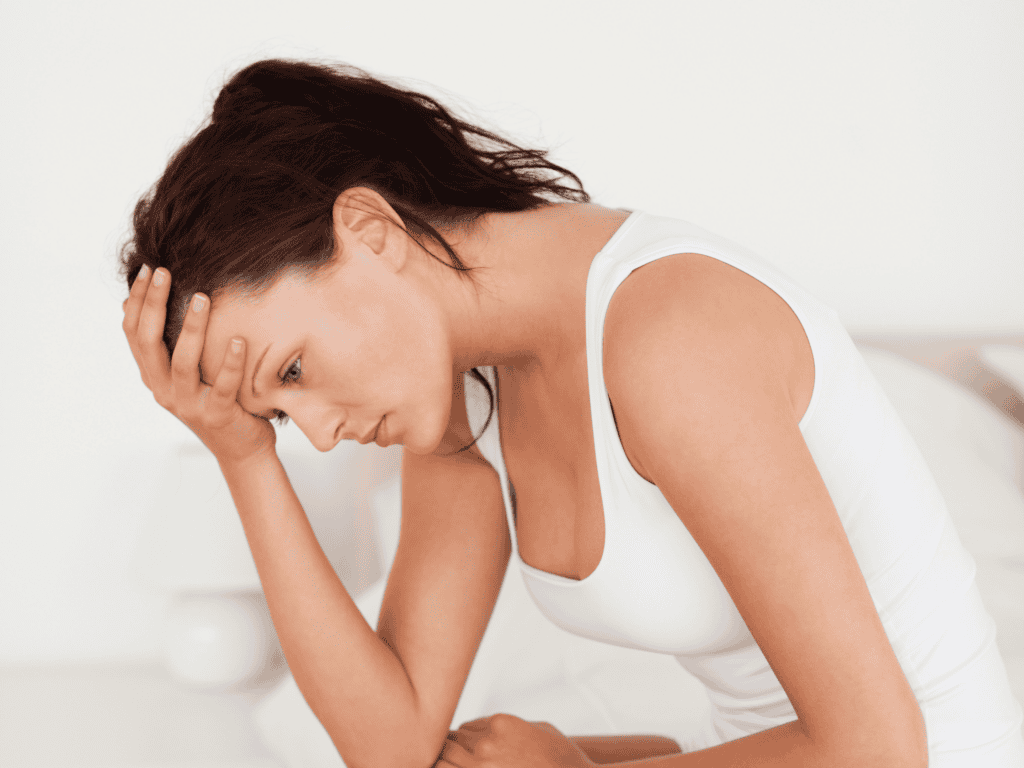Alcohol Withdrawal Symptoms
Symptoms of alcohol withdrawal, often called alcohol withdrawal syndrome, can range from mild alcohol withdrawal symptoms to severe alcohol withdrawal symptoms. These can include emotional symptoms, psychological symptoms, and physical symptoms.
Emotional and psychological signs of alcohol withdrawal can include mood swings, severe to mild anxiety, depression, and exacerbation of other mental conditions. Other common symptoms include:
- Anxiety
- Nausea
- Headaches
- Insomnia or sleep disturbances
- Sweating
- Seizures
- Hallucinations
- High blood pressure
- Severe confusion
A condition known as delirium tremens can also develop during the withdrawal period. While rare, it causes a combination of confusion, shaking, and hallucinations. It can even be fatal. When it does occur, it tends to happen in those with more severe alcohol dependence.
If you or a loved one is experiencing symptoms of alcohol withdrawal, it is important to seek immediate medical attention. Experienced addiction and medical professionals can offer effective support and treatment for both early symptoms and potentially life-threatening symptoms.

Alcohol Withdrawal Timeline
Most people will experience alcohol withdrawal symptoms within the first 6 hours of their last drink. Mild or minor withdrawal symptoms might include a feeling of anxiety, difficulty sleeping, headache, or nausea.
As time progresses, individuals may develop more severe symptoms. Within the first 72 hours, those with severe alcohol struggles might begin to vomit, sweat, hallucinate, experience a much faster heart rate than what is normal, and potentially even have seizures, sometimes called delirium tremens.
Physical withdrawal symptoms typically last approximately one week but will vary from person to person. Severe symptoms typically peak within 48 hours after the last drink.
The alcohol withdrawal timeline varies significantly from person to person. It’s a process that can start within hours after the last drink and may extend to weeks or even longer, depending on many factors. These include:
- Overall health
- Severity of alcohol intake
- Body chemistry
- Daily drinking habits So, how long does alcohol withdrawal last? It truly depends on the individual and their unique circumstances.
The path to sobriety is seldom linear, and understanding the timeline of alcohol withdrawal can help individuals navigate the process more effectively.
The timeline of withdrawal symptoms typically follows this pattern:
- The initial onset of symptoms occurs within 6 to 24 hours
- Symptoms reach their peak intensity within the first few days
- Symptoms gradually diminish in severity over time
Understanding this timeline is vital for those embarking on the withdrawal process, their loved ones, and healthcare providers offering support throughout the journey, including mental health services administration.
The Onset of Alcohol Withdrawal Symptoms
As the body begins to adjust to the absence of alcohol, the early signs of withdrawal make their presence felt within the first day following the last drink. Some of the first indications that the body is reacting to the sudden lack of a substance it has come to depend on, including alcohol cravings, are:
- Anxiety
- Insomnia
- Nausea
- Tremors
This initial phase is critical, as it sets the stage for what’s to come. It’s here that the foundation for a successful detox begins, with recognition and preparation playing key roles in managing the symptoms that arise as alcohol leaves the system.
Peak Intensity of Withdrawal Symptoms
The crescendo of the withdrawal process typically occurs between 48 to 72 hours after cessation of drinking, when symptoms such as headaches, nausea, and increased heart rate are at their most severe. During this difficult period, the assistance of medical professionals becomes indispensable due to the heightened risks associated with withdrawal.
This holds especially true for individuals with a history of chronic and excessive alcohol use, who face an increased likelihood of more severe withdrawal symptoms, including alcohol withdrawal seizures, due to alcohol abuse. In these cases, it is crucial to recognize the signs of alcohol use disorder and seek appropriate treatment.
The Diminishing Phase
After the storm comes the calm, generally, within 3 to 7 days of the last drink, the intensity of symptoms begins to wane. This phase brings a sense of relief as physical symptoms ease and the horizon of the recovery process appears clearer.
Within three weeks of abstinence, many will notice marked improvements in sleep quality, energy levels, and mood, providing motivation to continue the journey toward lasting sobriety.
What Causes Alcohol Withdrawal?
When someone drinks regularly for an extended period (this can be weeks, months, or years), the body’s central nervous system becomes accustomed to having alcohol in its system.
When they suddenly stop drinking alcohol, the brain interprets this as being abnormal. It works hard to keep their body in a heightened state that it typically experiences when they drink alcohol.
When this occurs, the individual will start experiencing withdrawal symptoms. This may lead to alcohol withdrawal syndrome, which can cause moderate and severe symptoms, or in some cases, can even cause life-threatening symptoms, including seizures (delirium tremens).
How To Prevent Alcohol Withdrawal
The best way to avoid alcohol withdrawal from occurring is by not engaging in excessive alcohol consumption. If you frequently drink, especially over a long period, you will have the symptoms associated with physically withdrawing from alcohol.
If you experience withdrawal symptoms when you stop drinking, help is available. Addiction treatment centers can provide detox programs with medical supervision to help with severe and mild symptoms, as well as provide follow-up care to help keep individuals safe and as comfortable as possible.

Treatment for Alcohol Addiction
Professional rehab treatment is extremely effective at helping individuals with alcohol addiction achieve lasting sobriety. The first step in addiction treatment is alcohol detox, followed by a rehab program.
Individuals may benefit from either inpatient treatment or outpatient treatment for alcohol use disorder and alcohol withdrawal symptoms. Outpatient settings can include partial hospitalization programs, intensive outpatient treatment options, and standard outpatient options. These are typically based on an individual’s necessary treatment level.
Alcohol Detox Program for Severe Withdrawal Symptoms
Alcohol detox offers effective alcohol withdrawal treatments that allow the body to withdraw from alcohol in a safe, medically supervised environment. Once the detox is complete, the inpatient rehab program begins.
Treatment Programs for Alcohol Use Disorder:
- Medical monitoring during the detox process
- Medication-assisted treatment when needed to help reduce the detox withdrawal symptoms
- Individual therapy
- Group therapy
- Dual-diagnosis treatment to address and treat any co-occurring disorders such as anxiety, depression, PTSD, and other mental health conditions
- 12-step support groups
- Nutritional meals
Follow Up Care
After an individual has received alcohol withdrawal treatment, they must continue with follow-up care. This can mean transitioning from inpatient care to an outpatient setting, following up with individual and group therapy sessions, and participating in support groups.
Groups such as Alcoholics Anonymous (AA) are peer-led and provide individuals with a supportive community where they can share their challenges with alcohol use disorder without fear of judgment. They can also find others who will encourage accountability and provide local resources to help with ongoing care.
This can help with alcohol cravings and provide a place for individuals to go when they are struggling with the desire to restart alcohol intake. Individuals can find meetings in their local community by checking on the AA website.
Get Help For Alcohol Addiction Today
Quitting alcohol and overcoming even the most severe symptoms is possible with the proper treatment and support. Our professional, dedicated team at Gloria Detox and Rehab Center is here to help you get your life back from alcohol use disorder and substance abuse. Our detox and inpatient rehab program offers effective evidence-based therapies for a unique and individualized approach to care.
Contact us today to begin alcohol addiction treatment by calling (818) 659-9444 or sending us a message through our secure online form.

